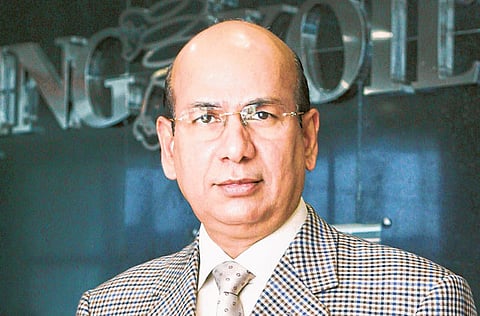Mattress-maker goes high tech
King Koil uses latest technology to ensure products suit all ages and needs

Dubai: Sleep deprivation can have a profound impact on a person's general health as well as his or her mood, energy level, job performance and overall productivity, according a study by UK's Better Sleep Council (BSC).
Those working in the legal or transport professions are most at risk of becoming sleep zombies. Sound sleep is becoming a thing of the past, almost like bedtime stories. But nearly three in ten people say getting a new bed could well provide the antidote.
DFMC, part of the AAA Al Moosa Group, was set up in 1993 to bring in the latest branded bedding and mattress products to the Middle East. It has brought to the regional market the likes of King Koil and Serta.
King Koil, the world's fifth largest mattress brand, has since emerged as the leading brand in the Middle East.
"The mattress industry in the Middle East has evolved consistently in line with that throughout the developed world as far as technology is concerned," said Sundar Rajan, chief executive of Dubai Furniture Manufacturing Co and distributor of the King Koil brand.
He was referring to Advance Pressure Support (APS) in the King Koil beddings, which lends additional support to the spine by taking into consideration the weight distribution of a human body.
According to the BSC study, 46 per cent of respondents reported they wake up frequently back, neck and shoulder pain that impacts their physical performance.
Upward thrust
The study showed a direct and dramatic link between lack of sleep and the incidence of shoulder pain, with 72 per cent of those averaging four hours or less of sleep per night waking up with motion-limiting pain and stiffness.
The Aps provide proper spinal alignment from anatomically correct support in the lumbar area and better quality rest by the reducing tossing and turning to find an ideal sleep posture.
When a person lies on the bed, the heavier part of the body puts additional pressure on the mattress.
"The APS system then applies an equal amount of upward thrust to help the person relax and sleep well," Rajan said.
"It caters to all types of customers — including those having back pain and other health issues. The new technologies make sleeping an enjoyable experience for all."
The company, which employs 200 people, produces about 800 high-end mattresses a day at its Dubai Investment Park factory, 70 per cent of which are exported.
Rajan estimates the Middle East bed demand to be anywhere between Dh550-Dh730 million.
"About 30 to 40 per cent of this belongs to the premium quality market in which we have 60 per cent market share," Rajan said. Although the impact of the global financial crisis had taken its toll on the UAE's real estate market and consequently on the interiors and home furnishing category, DFMC continued to witness growth.
In 1898, Samuel Bronstein started the company, King Koil, in St. Paul, Minnessota, US, with six employees in a small warehouse on the city's west side.
How beds originated
- In 3400 BC, the pharaohs discover the benefits of raising a pallet off the earth. King Tutankhamun had a bed of ebony and gold. Common people slept on palm leaves heaped in a corner.
- The first luxury bed came into being during the Roman Empire. Often decorated with gold, silver or bronze, these featured mattresses stuffed with reeds, hay, wool or feathers.
- Romans also discovered the waterbed. The sleeper would recline in a cradle of warm water until drowsy, then be lifted onto an adjacent cradle with a mattress.
- In the late 18th century came the advent of the cast iron bed and cotton mattresses that kept away bugs. Until then, assorted vermin were simply accepted as an accepted component of even the most royal beds.
- The first coil spring construction for bedding was patented in 1865.
- Innerspring mattresses and upholstered foundations came in the 1930s.
- The 1950s gave rise to foam rubber mattresses and pillows.
- Modern waterbeds spawned during the 1960s.
- In 1999, the queen-size mattress became popular in the US.
- The previous decade gave rise to a range of innerspring mattress designs, new types of foam mattress cores as well as airbeds, waterbeds and high-tech adjustable sleep sets.
- 72%: people sleeping for four hours or less per night
- 46%: respondents wake up with frequent neck and back pain
- 200: staff employed by Dubai Furniture Manufacturing
- 800: number of mattresses produced a day by DFMC



